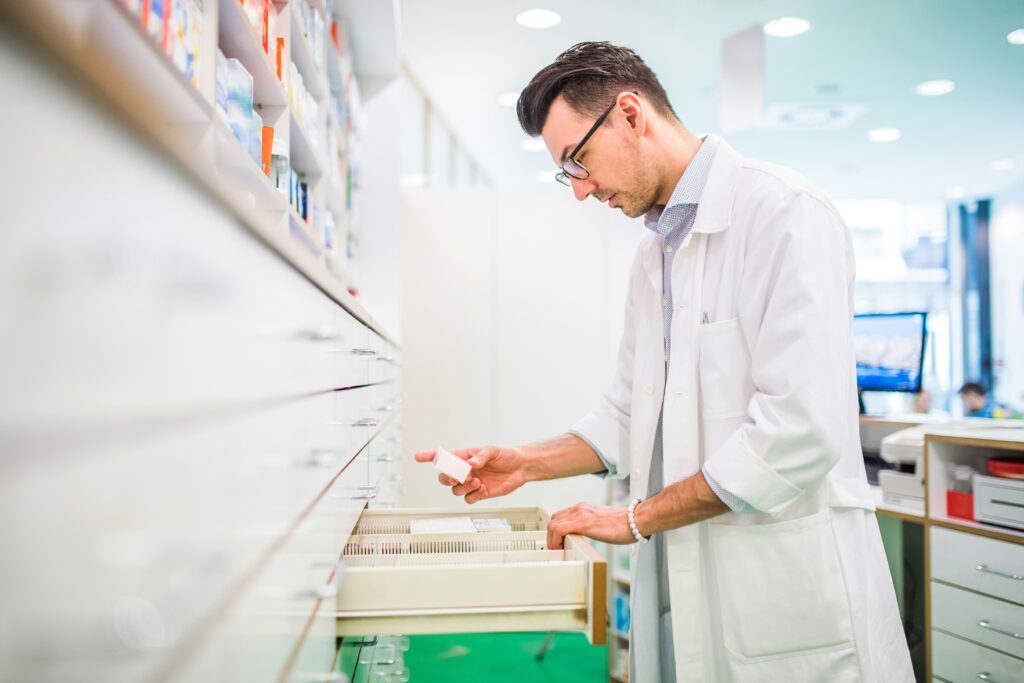When it comes to filling prescriptions, most of us automatically think of commercial pharmacies- those convenient, familiar chains we see on every corner where you can snag some pain relief, and maybe a pint of your favorite ice cream.
But there’s another option that’s rapidly gaining recognition for its personalized approach to healthcare- compounding pharmacies.
Whether you’re managing a chronic condition, considering hormone therapy, or simply need a more specialized medication, understanding the differences between commercial and compounding pharmacies can help you make the most informed decisions about your healthcare. Let’s talk about it.
Ready-Made Treatments: A Review of Commercial Pharmacies
Think of commercial pharmacies as the large gym chains of the world. No matter which branch you visit, you can count on seeing a lot of the same equipment and instructions for use, along with maybe some general nutrition advice.
Commercial pharmacies are the go-to destinations for most patients when they need over-the-counter (OTC) products or prescription medications. Pharmacies like CVS, Walgreens, Rite Aid, and many others offer a broad selection of medications for common health conditions. These pharmacies operate on a large scale and are built for convenience, focusing on mass production and distribution.
Advantages of Commercial Pharmacies
We’ve all been there: you go to your primary care physician for seasonal bronchitis, they prescribe medications to ease your cough and help you sleep, and an hour or two later you’re picking it up at the pharmacy drive-through down the street.
If you’ve ever been sick beyond what mom’s chicken noodle soup can remedy, it’s likely that you’ve witnessed first-hand some of the benefits of commercial pharmacies, including:
- Familiarity and Convenience: Commercial pharmacies are easily accessible, often open 24/7, and located in most neighborhoods. Their widespread availability makes it easy for customers to quickly pick up medications.
- Cost-Effectiveness: Due to their large-scale operations and volume of prescriptions filled, commercial pharmacies can offer medications at lower prices, making them a more affordable option for most.
- Wide Range of Medications: From pain relievers to antibiotics, commercial pharmacies stock a variety of ready-made medications to address common health concerns.
Limitations of Commercial Pharmacies
If you’ve ever had to stop using a medication because it was too strong or because you’re allergic to one of the ingredients, you may already be aware of some of the limitations of a commercial pharmacy. Limitations of commercial pharmacies include:
- Lack of Personalization: Commercial pharmacies often lack the flexibility to fully customize medications for individual needs. They operate based on standard, mass-produced formulations that may not address specific patient requirements or sensitivities.
- Limited Specialty Options: For patients requiring unique formulations, such as those with allergies to certain ingredients or those who need a combination of medications in one prescription, commercial pharmacies may not always be able to meet those needs.
Personalized Solutions: A Closer Look at Compounding Pharmacies
Compounding pharmacies, in contrast, are more like having a personal trainer develop a customized nutrition and workout program to meet your specific goals. Just as a trainer creates different plans for a 45-year-old woman focusing on weight loss versus a 22-year-old man building muscle, these pharmacies tailor medications to your unique requirements.
Compounding pharmacies formulate customized treatments based on the doctor’s prescription, tailored specifically to meet the unique needs of each patient. These pharmacies prepare medications in different forms, dosages, and combinations, offering a personalized approach to care.
Unlike commercial pharmacies, which dispense mass-produced drugs, compounding pharmacies create drugs in small, made-to-order batches, often using plant-based ingredients.
Key Features of Compounding Pharmacies
Modern compounding pharmacies combine time-tested pharmaceutical practices with cutting-edge technology. Having access to custom-compounded prescriptions opens up new opportunities for optimal patient care, including:
- Personalized Medication Solutions: A compounding pharmacy can modify the strength, form, and ingredients of a medication to suit individual preferences and needs, as prescribed by the physician.
- Enhanced Flexibility: For patients with allergies, sensitivities, or those who require a combination of drugs, compounding pharmacies can create bespoke formulations. For example, a patient may need a hormone therapy regimen adjusted to their exact hormonal levels, something that mass-produced drugs can’t replicate.
- Alternative Dosage Forms: Compounding pharmacies offer varied medication delivery methods. These delivery routes include injectable formulations (both subcutaneous and intramuscular), topical creams, various oral options (including capsules, tablets, troches, and oral suspensions), and nasal sprays for rapid absorption.
This flexibility ensures you receive your medication in the form that works best for your lifestyle and maximizes therapeutic benefit.
Comparing Commercial and Compounding Pharmacies
Let’s break this down further with a side-by side comparison of the purpose and features of commercial and compounding pharmacies.
Production Scale
- Commercial Pharmacies: Medications are mass-produced in large batches to meet the demand of the general population.
- Compounding Pharmacies: Medications are individually prepared, allowing for personalization based on the patient’s specific needs.
Personalization
- Commercial Pharmacies: Offer standardized, off-the-shelf medications that while meant for convenience, are not customized for individual patients.
- Compounding Pharmacies: Create custom medications that are formulated specifically for each patient, including adjustments for dosages, allergens, and delivery forms.
Regulatory Oversight
- Commercial Pharmacies: Governed by FDA regulations, ensuring that drugs are safe and effective for mass production and consumption.
- Compounding Pharmacies: Adhere to a combination of state and federal regulations, which include oversight by the FDA, the DEA, and state pharmacy boards. These pharmacies compound medications based on individual prescriptions, which gives them more flexibility, but also requires strict oversight.
Compounding pharmacies make up approximately 7,500 of the 56,000 retail or community pharmacies in the U.S., according to the American Pharmacists Association. This smaller, more specialized segment of pharmacies allows for more focused regulatory attention and oversight.
Cost Considerations
- Commercial Pharmacies: Medications are generally more affordable due to economies of scale and mass production.
- Compounding Pharmacies: Because compounded medications are made to order in individual batches when each prescription is received, they can be more expensive than those available at commercial pharmacies.
Availability and Access
- Commercial Pharmacies: Widely accessible in many neighborhoods, providing convenience and ease of access.
- Compounding Pharmacies: Operate with prescription requirements that ensure safety and legitimacy, with medications delivered directly to your doorstep. This prescription-based delivery model eliminates the need for in-person visits while maintaining pharmaceutical standards and oversight.

When Personalization Matters Most: When Should You Consider a Compounding Pharmacy?
While compounding pharmacies provide much more of a niche offering than your average corner pharmacy, we’re not here to tell you that you should be hunting down a high-tech compounding pharmacy to meet all of your medicinal needs.
Still, it’s important to know about options like this if you’re in need of solutions beyond typical pain relievers and ready-made formulations. Compounding pharmacies can be particularly beneficial for:
- Unique Health Needs: Compounding pharmacies are ideal when patients have specific requirements that can’t be met by commercially available medications. This includes patients who require unique hormone replacement therapies or those with allergies to common medication ingredients.
- Sensitive Health Conditions: For those with conditions that require non-standard medication delivery methods—such as creams for topical treatments—compounding pharmacies can provide convenient and effective alternatives.
- Bioidentical Hormone Therapy (BHRT): One of the most notable advantages of compounding pharmacies is their ability to create BHRT treatments.
Bioidentical hormones are made to exactly match the hormones your body naturally produces, providing a more tailored solution for those with hormonal imbalances due to menopause, thyroid disorders, or other conditions. Achieving and maintaining hormonal balance is a delicate and highly unique process for every patient; and one that should definitely be hand-tailored for safe, maximized results.
Benefits of Compounding Pharmacies for Your Health and Wellness
- Tailored Treatments for Better Outcomes: With personalized medications, patients are more likely to experience better results, as the treatments are specifically formulated to meet their health needs.
- Safer, More Suitable Alternatives: Patients with sensitivities or allergies to the fillers used in mass-produced drugs can find relief with compounded medications, which may use natural ingredients that are more compatible with the individual patient’s health.
- Improved Compliance and Convenience: By offering custom dosages, medication combinations, or alternative forms (like topical creams or patches), compounding pharmacies can increase adherence to treatment plans and make it easier for patients to take their medications as prescribed.
Patient First: Enhancing the Modern Healthcare Experience
When considering compounding pharmacies as an option as part of your healthcare, the most important thing to remember is your safety and comfort as the patient.
Your treatment plan should be backed by vetted, board-certified physicians who are experts in their field and who thoughtfully address your questions and concerns. You should feel confident that your physician is part of a highly qualified, collaborative team that is determined to improve your quality of life.
From there, your physician should take an active role in working closely with your pharmacy–whether commercial or compounding– to ensure that your treatment plan is coordinated and your needs are comprehensively met.
You should feel better. You should feel like yourself.
Taking the Next Step Toward Personalized Care
If you’re considering personalized care for your health or wellness needs, consider scheduling a complimentary, confidential consultation with the Evolve Telemedicine team.
We’re here to be that highly qualified, collaborative team to help guide you through your treatment options, providing the personalized attention and ongoing support you deserve.
This article is for informational purposes only and does not constitute medical advice. The information contained herein is not a substitute for professional medical advice. Always talk to your doctor about the risks and benefits of any treatment.






